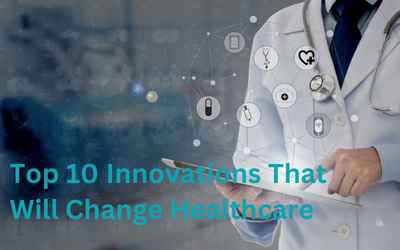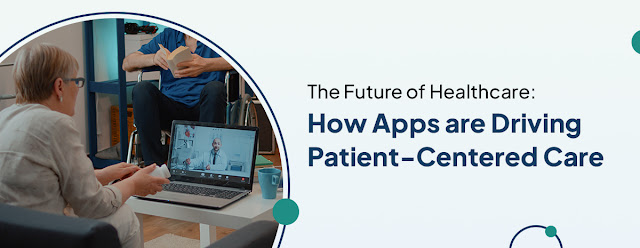Top 10 Innovations That Will Change Healthcare
Technology is changing healthcare and he future of
care is digital. And, while it might seem like a crazy thing to say, this is
actually true. Our medical system is based on an antiquated model that relies
on physical touch and smell to provide patient care. We’re rapidly moving
towards a world where we can provide all our patient needs through technology.
In this article we are going to talk about the ten
technologies that are changing healthcare:
- Artificial
Intelligence
- Blockchain
- Virtual
Reality
- Robots
- Mapping
technologies
- Big
Data
- Neurotechnology
- Blockchain
in Healthcare
- 5G
Mobile Technology
- Internet
of Medical Things
1. Artificial Intelligence is changing Healthcare
Artificial intelligence is changing healthcare. As
AI continues to evolve, it will become more and more advanced in predicting
health outcomes, providing personalized care plans, and even managing illness.
With this power at our fingertips, healthcare providers will be able to provide
better care for patients at home and in the office.
Artificial intelligence is
changing healthcare. As AI continues to evolve, it will become more and more
advanced in predicting health outcomes, providing personalized care plans, and
even managing illness. With this power at our fingertips, healthcare providers
will be able to provide better care for patients at home and in the office.
The power of artificial intelligence (AI) is
already being put to use in the medical field. One of the most exciting uses
for AI is in predictive analytics. Predictive analytics uses historical data
about a patient’s conditions and treatments to predict future outcomes based on
their current condition or symptoms. This allows physicians to make better
decisions about treatment options for patients who suffer from chronic
illnesses or have recurring health issues.
For example, if a patient
has had multiple hospital visits because of heart disease, doctors might use
predictive analytics software to see which treatments are most likely to be
successful based on past data collected on that particular patient’s condition
and treatment history. This information can help doctors make better decisions
about what treatment plan would be best suited for each individual patient—not
just average statistics on how many people responded positively or negatively
to certain medications in the past.
Artificial intelligence (AI) is changing
the face of healthcare. As AI continues to evolve, it will become more and more
advanced in predicting health outcomes, providing personalized care plans, and
even managing illness. With this power at our fingertips, healthcare providers
will be able to provide better care for patients at home and in the office.
The most exciting part about AI is that it can
predict future health outcomes with high accuracy—often better than humans can
predict. This is possible because AI uses data from past experiences and
studies to analyze patterns and make predictions about the future. For example,
if someone has a heart attack at age 45 and dies at age 49, the AI system could
predict that he would have died at age 50 based on those two variables alone.
One of the biggest challenges that AI faces in healthcare is making sure it stays
up-to-date with new medical knowledge as it evolves over time. There are many
different algorithms out there that try different approaches to solve this
problem by using different data sets or methods but none have been proven
superior yet so there’s still a lot of work being done on this front!
Another challenge is privacy concerns around having
such thorough access into people’s personal information.
2. Blockchain is changing Healthcare
Blockchain is another technology that is set to
change the way we manage care. By putting data into a secure blockchain ledger,
healthcare providers can track and share patient information with one another without
any third-party involvement. This will allow for more efficient treatment plans
and quicker diagnosis/treatment.
The blockchain system
allows for more transparency in the healthcare industry, which will benefit
both patients and providers. Patients will have better access to their electronic health records,
allowing them to take control of their own treatment plans, while providers
will have access to more detailed information about their patients’ medical
histories which can help them diagnose and treat patients faster.
This technology has already been used in a number
of ways, but there are still some challenges to overcome before it can be fully
implemented into our healthcare system. For example, some potential benefits
of blockchain technology include:
- Increased
patient privacy through encryption
- Better
prevention of fraud and identity theft
- Improved
drug safety by tracking drug supply chains more efficiently
- Reduced
costs due to reduced administrative burdens associated with processing
claims
3. Virtual Reality is changing Healthcare
We’re living in an age where we can’t believe our
eyes. Virtual reality is changing healthcare and it’s about time.
Virtual reality is another
cutting-edge technology that promises to revolutionize the way we think about
caring for patients. By using VR headsets to interact with medical images and
treatments, patients will be able to receive better care than ever before.
Nano-tech is also set to take on a big role in care in the next few years. By
using tiny implants called nanoparticles, nano-tech can help doctors treat
diseases at a deeper level than ever before possible.
Virtual reality is changing healthcare because it
allows doctors to treat patients without being physically present. For example,
if a doctor wants to perform surgery on someone who lives far away from them,
they could use virtual reality technology so that they’ll both be able to see
each other through their headsets while performing the surgery together
remotely instead of having to fly back home just for one day or two days each
year just so they can meet up face-to-face again so they can talk about what’s
going on with each other’s health condition or anything else related to their
personal life as well as professional career as well as personal finances.
One of the most exciting technologies in healthcare
right now is the use of virtual reality (VR). VR is a cutting-edge technology
that promises to revolutionize the way we think about caring for patients. By
using VR headsets to interact with medical images and
treatments, patients will be able to receive better care than ever before.
4. Robots are changing Healthcare
Robots are becoming increasingly used in the
healthcare industry, with some predictions that they will become the default
choice for many medical tasks. They’re able to do a variety of tasks faster and
more accurately than humans, and their ability to communicate with doctors and
nurses in real-time has already made them a popular choice for various medical
procedures.
Robots have been used to assist
with surgery in some cases for over 20 years, but their use has grown
exponentially in recent years. The number of robots used in hospitals has
increased and it’s not just surgical robots: there are also robots that can
assist with diagnosing patients, as well as robots that help nurses with simple
tasks like dispensing medication or cleaning up after surgery.
But what does this mean for doctors? Some experts
believe that automation will make it possible for physicians to focus on
higher-level tasks instead of being bogged down by the minutiae of everyday
life at work (such as data entry). It could also allow doctors who specialize
in one area – such as anesthesiology – to spend more time doing what they do
best while lessening.
Robots are being used in hospitals around the world
to assist with surgery and other procedures, which is an important step towards
their eventual dominance over human beings. They can also be programmed to
perform repetitive tasks like cleaning hospital rooms or delivering food trays
to patients who are staying overnight at a hospital.
Robotic surgery is one of the most common uses for
robots in hospitals today. These machines can perform operations that would
normally require hours of manual labor by surgeons—and with much higher
precision than experienced human hands could ever achieve. The most common
types of surgeries performed by robots include prostatectomies, appendectomies,
hysterectomies, prostate removals and hernia repairs (among others).
There are also robots being used in areas such as
pharmacy dispensing and pharmaceutical research labs where they handle delicate
work.
5. Mapping Technologies are changing Healthcare
Mapping technologies are also being used more
frequently in healthcare. By mapping patient profiles and images onto large
databases, doctors can more easily diagnose problems and plan treatments. This
technology is also being used to track patients’ progress over time and provide
information about their health.
These days, mapping technologies are
everywhere—from the navigation systems in your car to the maps on your phone.
Mapping technology has come a long way since its humble beginnings as a way for
sailors to navigate the open seas without getting lost. But what exactly are
mapping technologies? And how are they changing the world around us?
Mapping technologies allow us to create useful
representations of our surroundings. They provide us with visualizations that
make it easier for us to understand complex data sets, such as geographic
locations or social networks. Mapping technologies have been around since
ancient times when people created maps out of clay tablets or animal skins
filled with charcoal dust; however, they didn’t become widely available until
after World War II when electronic surveying equipment became available for
commercial use.
While mapping technologies have traditionally been
used in the fields of business and transportation, they are also being used
more frequently in healthcare. By mapping patient portal profiles and
images onto large databases, doctors can more easily diagnose problems and plan
treatments. This technology is also being used to track patients’ progress over
time and provide information about their health.
For example, a doctor might map an MRI scan of a
patient’s brain onto a database that includes images from other people who have
had similar scans. This allows doctors to compare their patient’s scan with
others who have experienced similar symptoms, providing them with important
information about how to proceed with treatment.
6. Big Data is changing Healthcare
Big Data is another big trend in
healthcare. By collecting data from a wide range of sources, hospitals can
better predict how diseases will spread and treat patients more effectively.
This technology is also being used to study human behavior and identify
patterns that could be useful for treatment or prevention.
This technology allows hospitals and medical
professionals to collect information about their patients’ health, including
their genetic information, environment, lifestyle choices and even habits such
as smoking or alcohol consumption. Hospitals are using this data to make better
decisions about patient care and provide better treatment plans.
The information collected by Big Data technology
can help doctors understand which conditions are likely to occur based on
certain behaviors or environmental factors that affect your health. It can also
help them predict what treatments will work best for each individual patient
based on their unique genetic makeup.
The idea behind big data is simple: collect as much
information as possible about people, places, and things and then use that
information to make decisions about what’s happening now (or predict what might
happen in the future). For example: if you have a patient with diabetes who has
been coming in for checkups every two months for five years but suddenly starts
coming in every week, you might want to know why!
And this is where big data comes in handy—if you’re
collecting all this information anyway (say through electronic health records),
then why not use it? If we can get enough people on board with this idea—and
enough data collected—we’ll be able to make some pretty amazing predictions
about disease outbreaks before they even happen.
7. Neurotechnology is changing Healthcare
Neurotechnology is changing Healthcare.
Neurotechnology is another exciting technology that’s starting to make its way
into the healthcare industry. By using brain waves to control machines,
neurotech is able to help doctors perform a wide range ofmedical tasks quickly
and accurately. This technology has the potential to revolutionize care, making
it easier for doctors to treat patients effectively and efficiently.
Neurotechnology allows doctors to perform a variety
of medical tasks with minimal effort
This new technology has many benefits for both
patients and medical professionals. For example, it can be used by
doctors who are unable to perform certain procedures due to physical
limitations or disabilities. It also helps reduce pain during treatment by
reducing muscle fatigue and increasing comfort levels.
However, there are some concerns surrounding this
technology as well. For example, some people may feel uncomfortable with the
idea of having their brain waves monitored while undergoing treatment because
they associate such monitoring with surveillance or invasion of privacy
(although these concerns are not necessarily valid).
Neurotechnology can be used in a variety of ways,
from helping surgeons perform complex procedures with greater precision than
ever before, to improving the accuracy of diagnostic tests like MRIs or CT
scans. Neurotechnology can also be used by patients themselves, allowing them
to monitor their own health through devices that detect changes in brain
activity.
Neurotechnology is still very new, but it’s already
being used in hospitals around the world.
8. Blockchain in Healthcare
With Blockchain innovation in healthcare, the ultimate goal of blockchain
is a decentralized accounting system that uses an EMR-independent blockchain
that controls the data. This will only happen when an authorized command by the
government or EMR opens the data store.
Innovative technology and cutting-edge blockchain-powered
ecosystem called CURES Token exists that is dodging a latent threat by
decentralizing healthcare systems, helping patients, healthcare app developers,
innovative healthcare innovation providers, and devices reduce costs and
leverage innovative technologies to make the most of limited resources in their
sector to create near-virtual competition. Get synergy and added value for all
relevant interest groups.
9. 5G Mobile Technology
High-speed communications and top healthcare innovations are not
usually interchangeable, but as wireless technology advances, we are beginning
to understand how mobile apps can dramatically improve the
lives of patients.
Qualcomm and Dr. David, Professor at Haas School of Business,
U.C Berkley and Chairman and CEO of the Berkeley Research Group, worked
together in an article entitled “5G Mobile Impact on Health Care Sector”.
Qualcomm Technologies Inc. commissioned this report to assess the potential
impact of 5G on the emerging innovative healthcare sector as the focus shifts
from volumetric healthcare to value-based healthcare, where $650
billion savings will be generated by 2025, according to Goldman Sachs.
10.Internet of Medical Things
Internet
of Medical Things (IoMT)
has brought about a revolution within the health
industry. It is used to monitor a facility’s healthcare technology and provide
performance alerts when an error occurs. IoMT applications can be used to
locate employees, patients, devices, and other resources in critical
environments. It is poised to become an integral part of healthcare
infrastructure as large companies like Microsoft offer enterprise-grade IoT
packages.
The below image shows the
revolution in healthcare and medicine in hospitals as a practice. The image
shows a patient with diabetes have an ID card that, when scanned, links to a
secure cloud that stores their electronic
health record vitals and lab results, medical and prescription histories.
Storing makes physicians and nurses access this record easily on a tablet or a
computer.
Technology is changing healthcare
The world of healthcare is changing. We’re moving
away from a model of “doctor knows best” to one where doctors and patients are
working together to make the most informed decisions about patient care.
These ten technologies are so radically changing
healthcare that insurance companies, hospitals, patients and pharmaceutical companies
must prepare for an innovation disruption in the healthcare system. It’s a
whole new world and it’s right around the corner!



Comments
Post a Comment